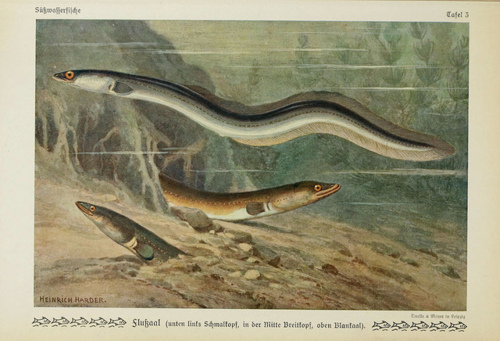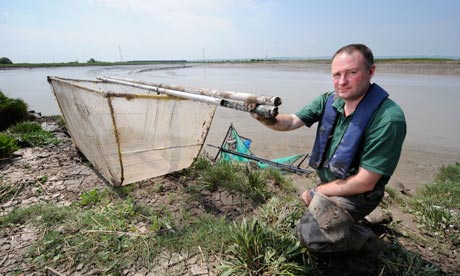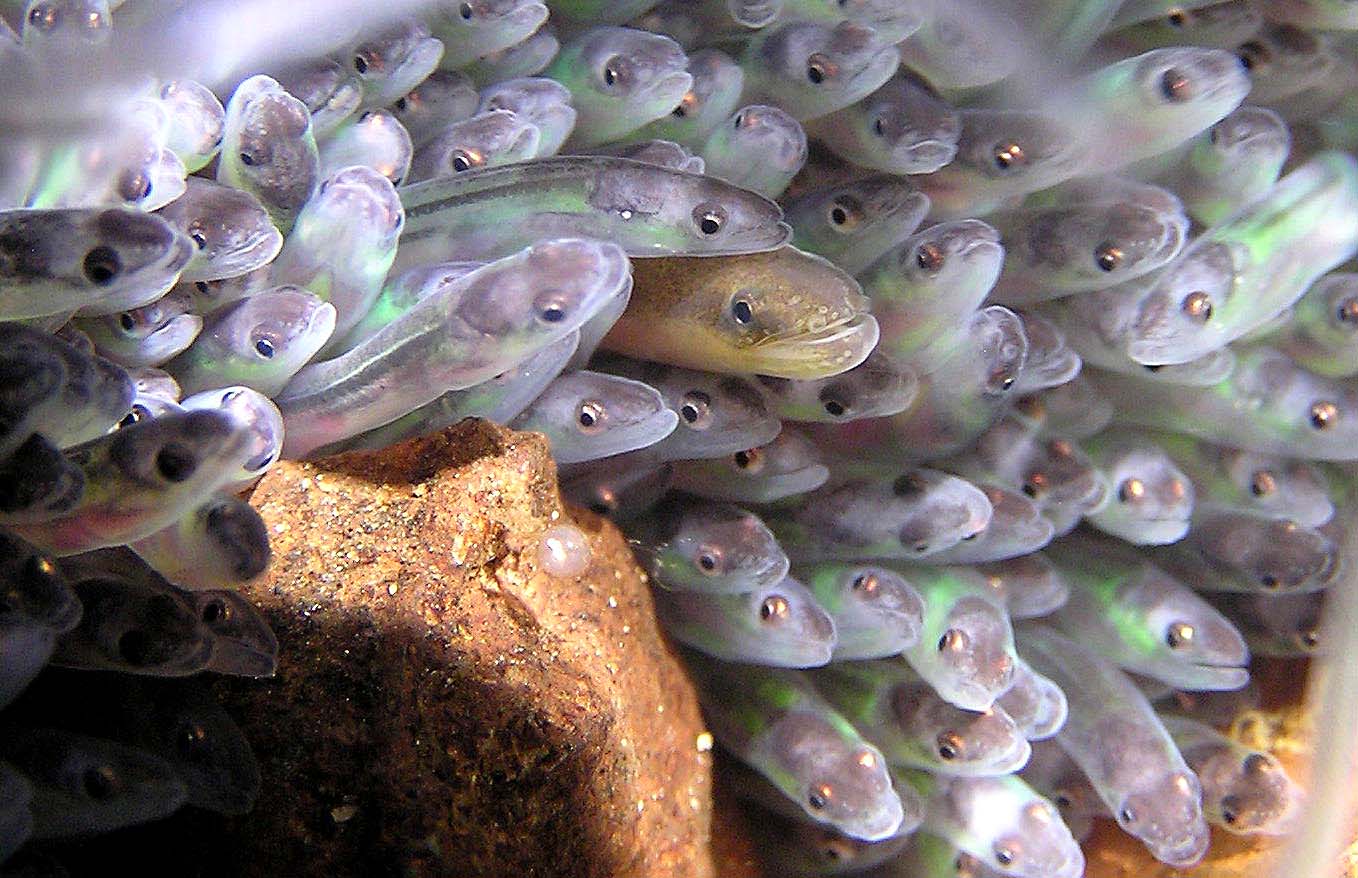Want to know more? This podcast episode complements this blog post:
Around a year ago I wrote a post about jellied eels and eel, pie and mash houses in London and I have been meaning to write a sequel on the subject of eel fishing and conservation for a while, as well as looking at some traditional recipes for the slippery fish.
The European eel Anguilla anguilla is a threatened species; the IUCN has put it on its Red List as a Critically Endangered animal, yet it is perfectly legal to eat them – and fish for them if you have a licence – the funny thing is adult stocks of eel has remained stable for the last few decades. So why has the eel been given this Critically Endangered status? Well it is because the young eels – known as elvers in Britain, but more commonly known as glass eels – have had the drastic drop in population. Some of these populations have crashed by 95% in some areas. The paradox is: how can the adult population be stable whilst the young have diminished in number so much?
Well the short answer is that we don’t know! Elvers resupply our rivers of stock eels after a long migration from the Sargasso Sea where they were born. Understandably, this part of the life cycle is poorly understood, and all scientists and conservationists can do is count the number reaching our estuaries and rivers and monitor them carefully.
In Britain, the main inlet for elvers is the River Severn; indeed there are still a decent number of elvers swimming into its mouth every year. However, the population has dropped overall in Europe by 75% and so the spectacle of the great migration is no longer what it was:
In the month of April; the shores of the Severn are annually darkened with innumerable quantities of elvers, which are seen fringing the sides of the river a black ascending line, which appears in constant motion…When the elvers appear in the river they are taken in great quantities with sieves of hair cloth, or even with a common basket, and after being scoured and are offered for sale. They are either fried in cakes, or stewed, and are accounted very delicious.
Illustrations of the Natural History of Worcestershire, Dr Hastings c.1830
Elvers were an essential food source in more ways than one according to Andrew Kerr of the Sustainable Eel Group: ‘entire communities would live on them; indeed … they were even used to fertilise the fields.’
A smaller-scale version of what Dr Hastings saw on the River Severn
See the story and video here: http://news.bbc.co.uk/local/gloucestershire/hi/people_and_places/nature/newsid_8864000/8864173.stm
The UK ‘elvering’ season is from February to May with its peak in April and it is legal to fish for them if you have the appropriate license; and it can be big business when they sell for £200 a kilo. They go for these huge prices because they are snapped up by the Chinese in order to restock their fisheries.
Elver fishermen have an obligation to fulfill if they want to go fishing for glass eels – 35% of their catch must be relocated upstream. Tiny elvers entering estuaries are often impeded from reaching rivers because of flood barriers. By physically moving them upstream they can do as nature intended and live their lives in British freshwater before slipping back to the Sargasso to breed. This seems to be working – numbers of elvers in the River Severn are on the up, though this could just be population fluctuation.
The Environment find a poacher’s oversized elver fishing net (from The Guardian 2010)
The ethical elverer after relocating a third of his catch, then sells the remainder to eel farms. The nearest ones to Britain are in Ireland and Holland. This is what the people at the Sustainable Eel Group say is the sustainable thing to do. Unethical elverers sell their catch on to people that have a penchant for elvers. He also uses huge oversized nets and trawlers – some nets can be up to 18m; compare this to the legal 2.5m net. (Amazingly trawling for elvers is still legal in Britain, though the number of eel fishing licenses are restricted.)
Have a look at this BBC report about elver poaching:
http://news.bbc.co.uk/local/gloucestershire/hi/people_and_places/nature/newsid_8708000/8708514.stm
So what do we conclude here? Well jellied eels are not to be consigned to the history books – with careful monitoring there should be well-stocked eel fisheries. It’s simple: only buy farmed eels, not wild, and on no account never buy elvers.
The following two posts will be some eel recipes (some you should try and some you should not!)
If you like the blogs and podcast I produce, please consider treating me to a virtual coffee or pint, or even a £3 monthly subscription: follow this link for more information.





Just to clarify – people tend to mean the Republic of Ireland when they use the term Ireland but in fact the commercial eel farms and fisheries are in Lough Neagh in Northern Ireland. All eel fishing, for eels or elvers, including at sea, is banned in the Republic of Ireland until stocks recover. The situation was reviewed last year and the ban extended until 2015 so the two large eels that live at the bottom of my garden and seem to manage to hang on however bad the floods are safe for some time to come. Thirty years ago elvers occasionally came up our stream but it is a long time since we have seen any, and we never saw them in the quantities Michael remembers seeing in Somerset when he was a boy
LikeLike
Yes I did mean NI – it was a typo! Oopsie
I did buy some wild eels a few years ago (I’ll discuss that in the next post…) I feel terribly guilty about it now. However they were sustainably caught, but I won’t be eating wild-caught until the elvers come back in force
LikeLike
Exports outside the EU are rightly illegal and this measure along with restoring habitat and unlocking migratory pathways are important conservation measures. on the severn last year 10 million were caught in handnets and 75% were used for restocking . do call if you need to know more07887993924.
LikeLike
Thanks very much for your comment Andrew. I know the measures taken to get number up AND into the rivers is no mean feat. My firat scientific publication was on the subject of elver sampling so I have always had a soft spot for them.
Thanks again
Neil
LikeLike
I nominated you for the Shine On Award here: http://mycookinglife.com/2013/02/06/my-mama-didnt-raise-no-fool/
LikeLike
“Thank you so much!” We Brits are no good at taking compliments so I’m quoting you…
Seriously – I’m so glad that you read and like my posts. An award like this spurns you on to get better and better at writing, so to know that people read it and think of it is very flattering.
Cheers!
Neil
LikeLike
You are very welcome and yes I love reading your posts! I agree getting this type of attention can motivate you.
LikeLike
Haven’t been on your site for awhile! Nice to see you again :). Eels have never appealed much – guess I can’t make out whether they are are more fish than snake or vice versa… I have always passed them up when they are encountere on a menu. Do you like them?
LikeLike
I do – eels are very delicious. A mild flavour and very succulent. I prefer them to salmon. They are too pricey of course to eat regularly – though an Asian supermarket in St Louis did sell them at a decent price…
LikeLike
Okay! Maybe I’ll get a chance to be brave and try them while we’re next in italy (soon hope 🙂 )
LikeLike
Just don’t try jellied eels. NOT for faint-hearted!
LikeLike
Start with smoked eel – wonderfully delicate – and gradually explore from there. But if you do like gelatinous foods or fish terrines there’s nothing nicer
LikeLike
Ewww. Thanks for the warning 🙂 I don’t much like jellied anything… (Usually I’m a fairly adventurous eater)
LikeLike
I love eels! Im actually going eeling tonight with a friend. I normally catch 4 or 5 and them smoke them the next day!
Wonderful food!
LikeLike
I am very jealous, William, of both your eels and your smoker! I’d love to go eeling. Do you need a fishing license? What do you use as traps?
LikeLike